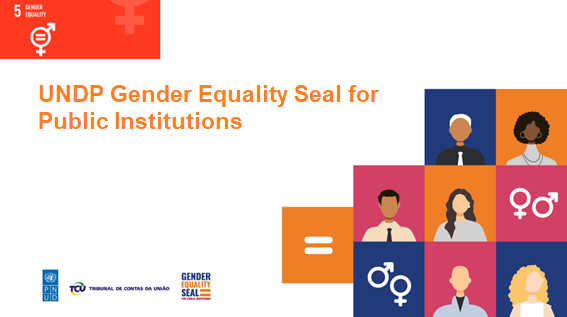Gender Equality Seal: UNDP report shows progress and challenges for the TCU
Por Secom

In August, the Brazilian Federal Court of Accounts (TCU) and the United Nations Development Program (UNDP) conducted two surveys in collaboration to gather feedback from male and female civil servants on the workplace environment and their skills related to gender issues. The surveys were part of the diagnostic stage of joining the UNDP Gender Equality Seal for Public Institutions. Using survey results and documentation from the institution, the UNDP compiled a report that discusses the TCU's adherence to the criteria for obtaining the Seal.
According to the report, the Court has been implementing a set of actions related to gender equality since 2022. As a result, it has so far met 34% of the criteria needed for obtaining the Seal. The TCU's most notable progress is in the axes “Work environments that enable gender equality” and “Participation, partnership and responsibility”.
The advances in these areas are the result, among other actions, of the approval of the Policy for Preventing and Fight against Moral and Sexual Harassment and All Forms of Violence and Discrimination, through Regulation-TCU Nº 41 of March 2024, and the fact that the Court actively participates in national and international cooperation spaces with a focus on gender, such as the Equity Network and the Gender, Inclusion, and Diversity Observatory of OLACEFS.
Both surveys exceeded the minimum number of responses stipulated by the UNDP. The Work Environment Assessment Survey registered a total of 475 responses, while the Gender Capacity Self-Assessment Survey reached 444 responses. The Technical Team for the implementation of the Gender Equality Seal at the TCU highlighted the most relevant aspects identified in each of them. Check out the details below:
Work Environment Assessment Survey
The first survey was designed to gather insights from both male and female civil servants about the workplace, with a specific focus on gender equality. The questions covered a variety of topics, including the recruitment, selection, and hiring process; performance assessment and internal promotion; training; institutional communication; harassment and discrimination; salary policies and managing work-life balance.
In terms of evaluating performance and internal promotion, 80% of those surveyed think that the staff performance assessment process is fair and unbiased. However, almost half of the women do not believe that men and women are treated fairly and equally when it comes to internal promotion processes. For the TCU, internal promotion involves being assigned to positions of trust.
As for discrimination, most of the male and female civil servants surveyed believe that the TCU takes adequate and sufficient measures to eradicate cases of discrimination in the workplace. However, there is a large gender gap in this respect: while only 56% of the women taking part in the survey agree with this idea, this number is over 80% for men.
When it comes to sexual harassment, around 82% of the male and female civil servants surveyed believe that the institution has an operating procedure that guarantees fair treatment for victims. However, there is once again a gap of over 10 percentage points in how men and women perceive the subject, with women showing less agreement.
Over half of women stated that they would be unsure where or how to report incidents of sexual harassment and discrimination, and they were uncertain about being treated fairly.
Gender Capacity Self-Assessment Survey
In the second survey, male and female civil servants were asked to evaluate their own capacities regarding gender issues. The questionnaire covered topics such as conceptual understanding, knowledge and application of gender equality instruments, programmatic capacities on gender, and external institutional leadership on gender issues.
As for understanding the concepts, more than 80% of the male and female civil servants surveyed said they understood the concepts of gender equality and equity.
One positive point identified is that four out of five male and female civil servants claim they are aware of the relation between their duties and the promotion of gender equality. In addition, around 50% of the people who responded to the survey are in the habit of applying gender equality and/or non-discrimination policies, strategies, and plans in the context of their work, even though there is a disparity of more than 10 percentage points between women and men.
Regarding programmatic capacities on gender, less than half of the people feel able to identify and prioritize the main themes of gender equality in their own work, such as in program development, and work planning, among other situations; the level reported by women is almost 10 points below the average.
In its assessment, the UNDP emphasized the Court's commitment to maintaining equity as one of the relevant issues on its agenda, regardless of institutional changes. In the institution's view, the biggest challenge for the TCU will be to incorporate the gender agenda systematically and permanently into the Institutional Strategic Planning and the results and impacts of its external control actions.
Based on the Seal's methodology, the TCU is building an Action Plan to improve its work on the established criteria and thus make further progress in promoting gender equality within the institution.
The executive reports with the complete analysis and detailed results of both surveys, as well as the integrated baseline report, are available on the UNDP Gender Equality Seal SharePoint: discover the Gender Equality Seal page.